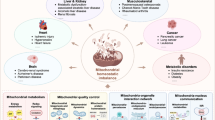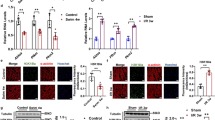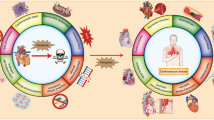Abstract
The development of heart failure is associated with alterations in the expression of a wide variety of structural, signaling, and metabolic proteins. One such effect is the downregulation of uncoupling proteins in the setting of heart failure. This group of proteins regulates the mitochondrial membrane potential and therefore plays a role in mitochondrial energy metabolism as well as reactive oxygen species generation by the mitochondria. This review discusses the role of uncoupling proteins in regulating oxidant stress and implications with respect to the pathogenesis of heart failure and potential treatments.
Similar content being viewed by others
References and Recommended Reading
Benjamin IJ, Schneider MD: Learning from failure: congestive heart failure in the postgenomic age. J Clin Invest 2005, 115:495–499.
deGoma EM, Vagelos RH, Fowler MB, Ashley EA: Emerging therapies for the management of decompensated heart failure: from bench to bedside. J Am Coll Cardiol 2006, 48:2397–2409.
Hwang JJ, Allen PD, Tseng GC, et al.: Microarray gene expression profiles in dilated and hypertrophic cardiomyopathic end-stage heart failure. Physiol Genomics 2002, 10:31–44.
Chen Y, Park S, Li Y, et al.: Alterations of gene expression in failing myocardium following left ventricular assist device support. Physiol Genomics 2003, 14:251–260.
Depré C, Shipley GL, Chen W, et al.: Unloaded heart in vivo replicates fetal gene expression of cardiac hypertrophy. Nat Med 1998, 4:1269–1275.
Young ME, Patil S, Ying J, et al.: Uncoupling protein 3 transcription is regulated by peroxisome proliferator-activated receptor (alpha) in the adult rodent heart. FASEB J 2001, 15:833–845.
Razeghi P, Young ME, Ying J, et al.: Downregulation of metabolic gene expression in failing human heart before and after mechanical unloading. Cardiology 2002, 97:203–209.
Taegtmeyer H, Razeghi P, Young ME: Mitochondrial proteins in hypertrophy and atrophy: a transcript analysis in rat heart. Clin Exp Pharmacol Physiol 2002, 29:346–350.
Giordano FJ: Oxygen, oxidative stress, hypoxia, and heart failure. J Clin Invest 2005, 115:500–508.
Givertz MM, Colucci WS: New targets for heart-failure therapy: endothelin, inflammatory cytokines, and oxidative stress. Lancet 1998, 352(Suppl 1):SI34–SI38.
Diaz-Velez CR, Garcia-Castineiras S, Mendoza-Ramos E, Hernandez-Lopez E: Increased malondialdehyde in peripheral blood of patients with congestive heart failure. Am Heart J 1996, 131:146–152.
Mallat Z, Philip I, Lebret M, et al.: Elevated levels of 8-iso-prostaglandin F2alpha in pericardial fluid of patients with heart failure: a potential role for in vivo oxidant stress in ventricular dilatation and progression to heart failure. Circulation 1998, 97:1536–1539.
Baumer AT, Flesch M, Wang X, et al.: Antioxidative enzymes in human hearts with idiopathic dilated cardiomyopathy. J Mol Cell Cardiol 2000, 32:121–130.
Sam F, Kerstetter DL, Pimental DR, et al.: Increased reactive oxygen species production and functional alterations in antioxidant enzymes in human failing myocardium. J Card Fail 2005, 11:473–480.
Nojiri H, Shimizu T, Funakoshi M, et al.: Oxidative stress causes heart failure with impaired mitochondrial respiration. J Biol Chem 2006, 281:33789–33801.
Hiroi S, Harada H, Nishi H, et al.: Polymorphisms in the SOD2 and HLA-DRB1 genes are associated with nonfamilial idiopathic dilated cardiomyopathy in Japanese. Biochem Biophys Res Commun 1999, 261:332–339.
Valenti L, Conte D, Piperno A, et al.: The mitochondrial superoxide dismutase A16V polymorphism in the cardiomyopathy associated with hereditary haemochromatosis. J Med Genet 2004, 41:946–950.
Nakamura K, Kusano, KF, Matsubara H, et al.: Relationship between oxidative stress and systolic dysfunction in patients with hypertrophic cardiomyopathy. J Card Fail 2005, 11:117–123.
Ye G, Metreveli NS, Ren J, Epstein, PN: Metallothionein prevents diabetes-induced deficits in cardiomyocytes by inhibiting reactive oxygen species production. Diabetes 2003, 52:777–783.
Kawai K, Qin F, Shite J, et al.: Importance of antioxidant and antiapoptotic effects of beta-receptor blockers in heart failure therapy. Am J Physiol Heart Circ Physiol 2004, 287:H1003–H1012.
Shiomi T, Tsutsui H, Matsusaka H, et al.: Overexpression of glutathione peroxidase prevents left ventricular remodeling and failure after myocardial infarction in mice. Circulation 2004, 109:544–549.
Fleury C, Neverova M, Collins S, et al.: Uncoupling protein-2: a novel gene linked to obesity and hyperinsulinemia. Nat Genet 1997, 15:269–272.
Gimeno RE, Dembski M, Weng X, et al.: Cloning and characterization of an uncoupling protein homolog: a potential molecular mediator of human thermogenesis. Diabetes 1997, 46:900–906.
Sack MN: Mitochondrial depolarization and the role of uncoupling proteins in ischemia tolerance. Cardiovasc Res 2006, 72:210–219.
Murray AJ, Anderson RE, Watson GC, et al.: Uncoupling proteins in human heart. Lancet 2004, 364:1786–1788.
Vidal-Puig A, Solanes G, Grujic D, et al.: UCP3: an uncoupling protein homologue expressed preferentially and abundantly in skeletal muscle and brown adipose tissue. Biochem Biophys Res Commun 1997, 235:79–82.
Matsuda J, Hosoda K, Itoh H, et al.: Cloning of rat uncoupling protein-3 and uncoupling protein-2 cDNAs: their gene expression in rats fed high-fat diet. FEBS Lett 1997, 418:200–204.
Douette P, Sluse FE: Mitochondrial uncoupling proteins: new insights from functional and proteomic studies. Free Radic Biol Med 2006, 40:1097–1107.
Liu SS: Generating, partitioning, targeting and functioning of superoxide in mitochondria. Biosci Rep 1997, 17:259–272.
Vidal-Puig AJ, Grujic D, Zhang CY, et al.: Energy metabolism in uncoupling protein 3 gene knockout mice. J Biol Chem 2000, 275:16258–16266.
Mattiasson G, Shamloo M, Gido G, et al.: Uncoupling protein-2 prevents neuronal death and diminishes brain dysfunction after stroke and brain trauma. Nat Med 2003, 9:1062–1068.
Bechmann I, Diano S, Warden CH, et al.: Brain mitochondrial uncoupling protein 2 (UCP2): a protective stress signal in neuronal injury. Biochem Pharmacol 2002, 64:363–367.
Teshima Y, Akao M, Jones SP, Marban E: Uncoupling protein-2 overexpression inhibits mitochondrial death pathway in cardiomyocytes. Circ Res 2003, 93:192–200.
Fox KF, Cowie MR, Wood DA, et al.: Coronary artery disease as the cause of incident heart failure in the population. Eur Heart J 2001, 22:228–236.
Bienengraeber M, Ozcan C, Terzic A: Stable transfection of UCP1 confers resistance to hypoxia/reoxygenation in a heart-derived cell line. J Mol Cell Cardiol 2003, 35:861–865.
Hoerter J, Gonzalez-Barroso MD, Couplan E, et al.: Mitochondrial uncoupling protein 1 expressed in the heart of transgenic mice protects against ischemic-reperfusion damage. Circulation 2004, 110:528–533.
Bodyak N, Rigor DL, Chen YS, et al.: Uncoupling protein-2 modulates cell viability in adult rat cardiomyocytes. Am J Physiol Heart Circ Physiol 2007, 293:H829–H835.
McLeod CJ, Aziz A, Hoyt RF Jr, et al.: Uncoupling proteins 2 and 3 function in concert to augment tolerance to cardiac ischemia. J Biol Chem 2005, 280:33470–33476.
Guo P, Mizushige K, Noma T, et al.: Association of uncoupling protein-2 expression with increased reactive oxygen species in residual myocardium of the enlarged left ventricle after myocardial infarction. Heart Vessels 2005, 20:61–65.
Boss O, Samec S, Dulloo A, et al.: Tissue-dependent upregulation of rat uncoupling protein-2 expression in response to fasting or cold. FEBS Lett 1997, 412:111–114.
Blanc J, Alves-Guerra MC, Esposito B, et al.: Protective role of uncoupling protein 2 in atherosclerosis. Circulation 2003, 107:388–390.
Oberkofler H, Iglseder B, Klein K, et al.: Associations of the UCP2 gene locus with asymptomatic carotid atherosclerosis in middle-aged women. Arterioscler Thromb Vasc Biol 2005, 25:604–610.
Noma T, Nishiyama A, Mizushige K, et al.: Possible role of uncoupling protein in regulation of myocardial energy metabolism in aortic regurgitation model rats. FASEB J 2001, 15:1206–1208.
Neubauer S: The failing heart—an engine out of fuel. N Engl J Med 2007, 356:1140–1151.
Ashrafian H, Frenneaux MP, Opie LH, et al.: Metabolic mechanisms in heart failure. Circulation 2007, 116:434–448.
Hesselink MK, Schrauwen P: Uncoupling proteins in the failing human heart: friend or foe? Lancet 2005, 365:385–386.
Zhou M, Lin BZ, Coughlin S, et al.: UCP-3 expression in skeletal muscle: effects of exercise, hypoxia, and AMP-activated protein kinase. Am J Physiol 2000, 279:E622–E629.
Stoppani J, Hildebrandt AL, Sakamoto K, et al.: AMP-activated protein kinase activates transcription of the UCP3 and HKII genes in rat skeletal muscle. Am J Physiol 2002, 283:E1239–E1248.
Russell RR III, Li J, Coven DL, et al.: AMP-activated protein kinase mediates ischemic glucose uptake and prevents postischemic cardiac dysfunction, apoptosis, and injury. J Clin Invest 2004, 114:495–503.
Author information
Authors and Affiliations
Corresponding author
Rights and permissions
About this article
Cite this article
Laskowski, K.R., Russell, R.R. Uncoupling proteins in heart failure. Curr Heart Fail Rep 5, 75–79 (2008). https://doi.org/10.1007/s11897-008-0013-1
Published:
Issue Date:
DOI: https://doi.org/10.1007/s11897-008-0013-1




